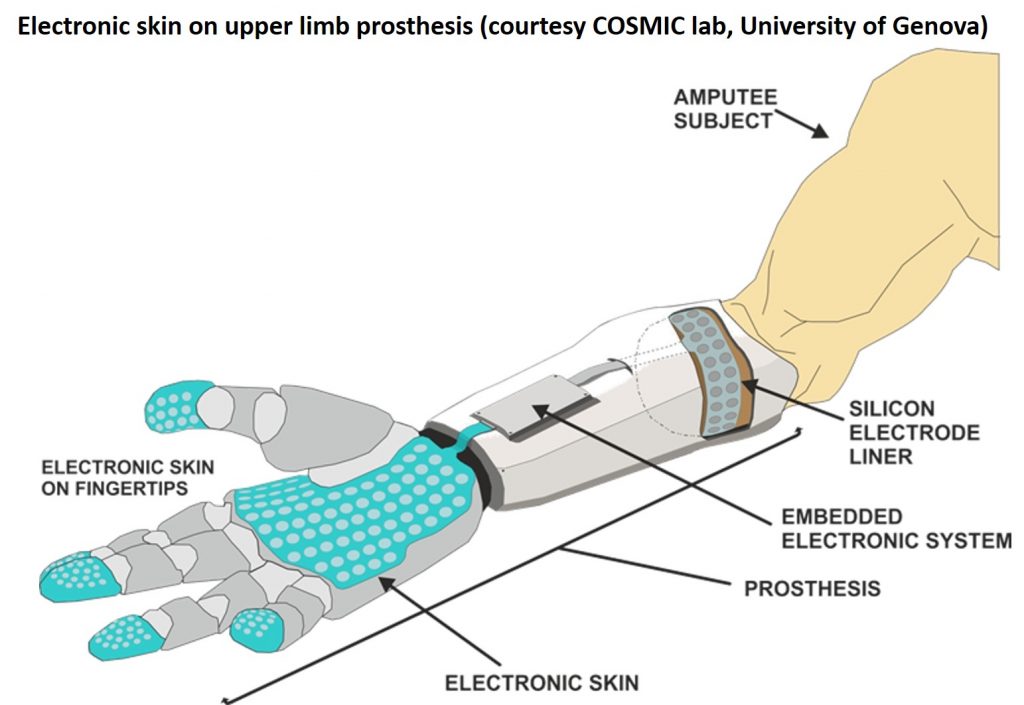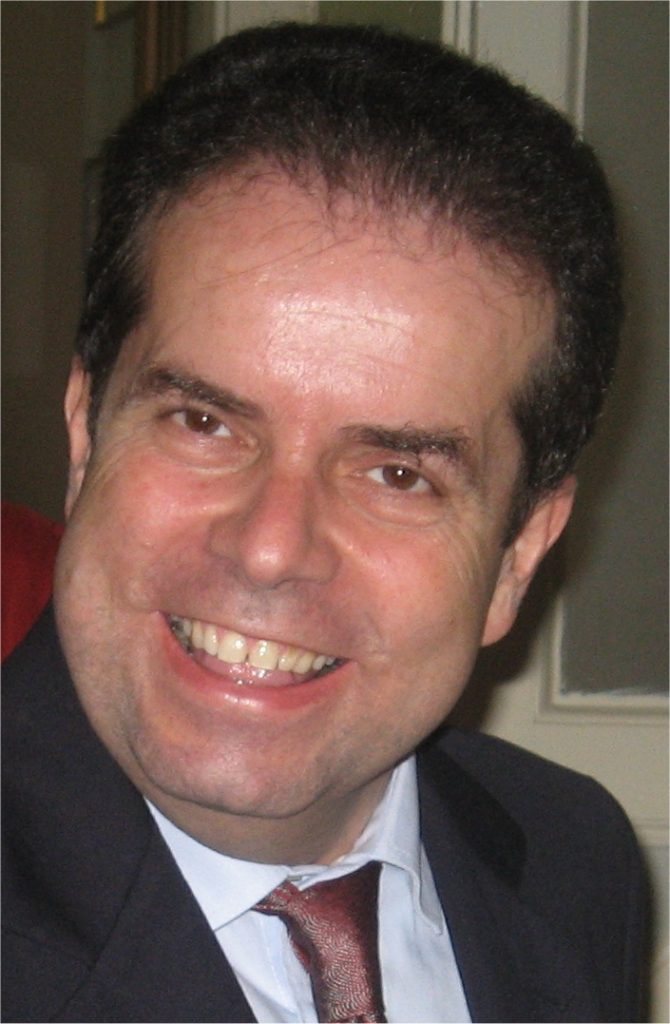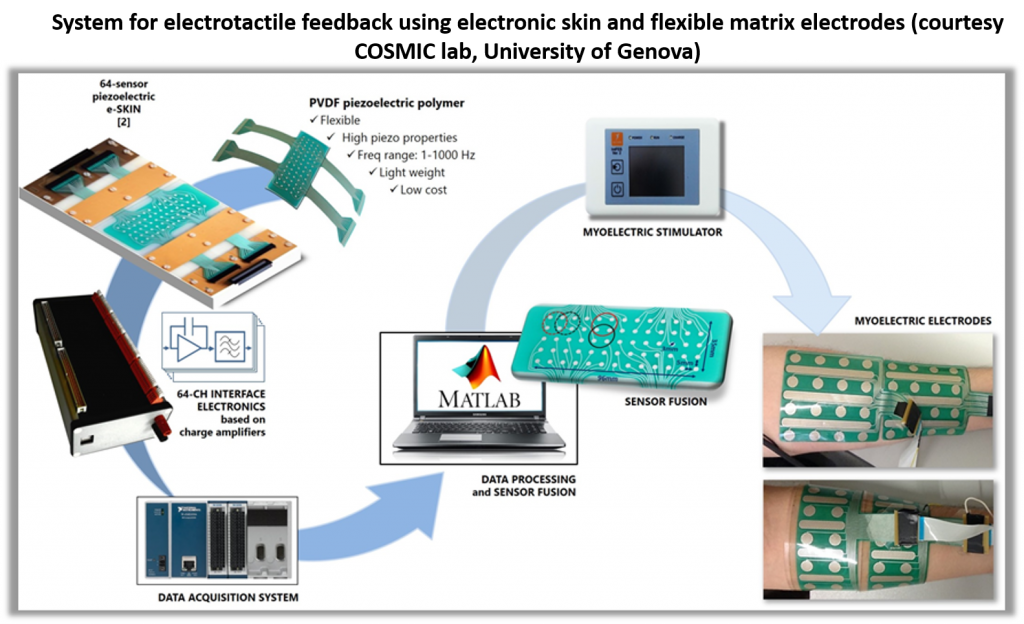Scope
The human skin implements many different functions and in particular tactile sensing which is one of the main functions through which humans safely interact with the environment and explore their surroundings.
 Tactile sensing is a complex task which must be accomplished in an effective way (e.g. real-time response, lightweight, low power consumption, etc.) all over the body surface. Tactile sensors are basically distributed sensors which translate mechanical variables (e.g. pressure, strain), temperature, humidity and pain stimuli into electrical variables. Contact information is further processed and conveyed to the “brain” (human or artificial). Tactile arrays ought to be mechanically flexible (i.e. conformable to the object to be applied on) and stretchable and tactile information processing must be implemented in real time. The development of artificial tactile sensing is a very challenging goal which involves numerous research areas. Application domains include humanoid and industrial robotics, prosthetics, biomedical instrumentation, healthcare, cyber physical systems, virtual reality, arts, to name a few. Many issues (whole body awareness (i.e., large area skin), conformability and stretchability, structured design methodology, maintenance, calibration, system integration, interpretation of tactile data, reliability, robustness, scalability, effective use of materials, small size and low power consumption, etc.) are still open and require a coordinated and strong effort to be effectively tackled.
Tactile sensing is a complex task which must be accomplished in an effective way (e.g. real-time response, lightweight, low power consumption, etc.) all over the body surface. Tactile sensors are basically distributed sensors which translate mechanical variables (e.g. pressure, strain), temperature, humidity and pain stimuli into electrical variables. Contact information is further processed and conveyed to the “brain” (human or artificial). Tactile arrays ought to be mechanically flexible (i.e. conformable to the object to be applied on) and stretchable and tactile information processing must be implemented in real time. The development of artificial tactile sensing is a very challenging goal which involves numerous research areas. Application domains include humanoid and industrial robotics, prosthetics, biomedical instrumentation, healthcare, cyber physical systems, virtual reality, arts, to name a few. Many issues (whole body awareness (i.e., large area skin), conformability and stretchability, structured design methodology, maintenance, calibration, system integration, interpretation of tactile data, reliability, robustness, scalability, effective use of materials, small size and low power consumption, etc.) are still open and require a coordinated and strong effort to be effectively tackled.
The Italian community working is the tactile sensing field has a long and solid tradition; the areas of interest span e.g. human physiology, neuroscience, material science, electronics, robotics, bioengineering.
The aim of the TC is to build a bridge between different research areas in tactile sensing, create a common background sharing documents and knowledge, promote the creation of project consortia, Ph.D. summer schools, technical events, workshops, facilitate the technology transfer towards industry and the collaboration with the industrial sector and the cross-fertilization among Italian researchers in the field.
Chair
 Maurizio Valle received the M.S. degree in Electronic Engineering in 1985 and the Ph.D. degree in Electronic and Computer Science Engineering in 1990 from the University of Genova, Italy. From 1992 to 2006 he was assistant professor and since January 2007, he is associate professor in Electronic Engineering at Department of Electrical, Electronic and Telecommunications Engineering and Naval Architecture, University of Genova, where he is Head of Connected Objects, Smart Materials, Integrated Circuits – COSMIC laboratory. In 2017 he has got the Italian National Scientific Habilitation to the role of Full Professor of Electronics.
Maurizio Valle received the M.S. degree in Electronic Engineering in 1985 and the Ph.D. degree in Electronic and Computer Science Engineering in 1990 from the University of Genova, Italy. From 1992 to 2006 he was assistant professor and since January 2007, he is associate professor in Electronic Engineering at Department of Electrical, Electronic and Telecommunications Engineering and Naval Architecture, University of Genova, where he is Head of Connected Objects, Smart Materials, Integrated Circuits – COSMIC laboratory. In 2017 he has got the Italian National Scientific Habilitation to the role of Full Professor of Electronics.
Maurizio Valle has been and is in charge of many research contracts and projects funded at local, national and European levels and by Italian and foreign companies. He is Member of the IEEE CAS Society and IEEE senior member.
Prof. Valle is co-author of more than 200 papers on peer-reviewed international scientific journals and conference proceedings. His research interests include bio-medical circuits and systems, electronic/artificial sensitive skin, embedded electronic systems for tactile sensors, tactile sensing systems for prosthetics and robotics, neuromorphic touch sensors, wireless sensor networks.
